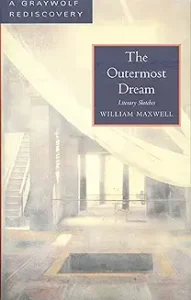The Outermost Dream: Essays and Reviews by William Maxwell 1989
Maxwell is one of those literary figures with whom I’ve become somewhat obsessed. In part it’s his important and long running relationship with The New Yorker, my favorite magazine where he edited fiction from 1936 to 1975. It was an incredible run during which he worked with writers such as Vladimir Nabokov (another one of my obsessions!), John Updike (a third!), John Cheever, J.D. Salinger, John O’Hara, Eudora Welty, Shirley Hazzard, Isaac Bashevis Singer, and others. What an incredible editor, writer, and person he must have been to have been able to help shape the output of so many extraordinary writers.
Maxwell, himself, was the author of six novels, short stories and essays, children’s stories, and a memoir. His fiction describes themes of childhood, family, loss and lives changed quietly and irreparably in small towns in the Midwest where he was born in 1908 in Lincoln, Illinois. His 1980 novel, ‘So Long, See You Tomorrow’ (#2657) won a National Book Award in 1982 and was nominated for the Pulitzer. It’s a moving tale of love and loss.
‘The Outermost Dream’ collects 19 of Maxwell’s book reviews, most of which were originally published in The New Yorker. Calling them book reviews does not quite capture their content, form, or scope. He does begin with a book but he sites his comments about that particular book into a wide-ranging, fascinating, and erudite exploration of that author’s works and how they influence and were influenced by the times and setting in which the book was written. Ranging from Virginia Woolf to E.M. Forster, from Eudora Welty to Louise Bogan, who was the poetry editor of The New Yorker for decades, the longest essay in the collection is about Sylvia Townsend Warner whose name I only vaguely recognized. Born in 1897, she was a pioneer in feminism and Lesbian literature, writing more than 150 articles for The New Yorker, poetry, essays, and a memoir. Maxwell was largely responsible for bringing her work to publication and became a close friend and the executor of her estate.
I was hooked on this book by the very first essay, a review of a strange and little known book, ‘Kilvert’s Diary 1870-1879: Life in the English Countryside in Mid-Victorian Times’. This is a book that almost nobody knows or has read. Amazingly, as I write this, it sits barely five feet from me on my shelf here in Cambridge. Why would this strange work which Kilvert, an Anglican curate in a small English village, wrote in the mid-19th C be in my library especially since Kilvert himself questioned his work as follows: “Why do I keep this voluminous journal? I can hardly tell. Partly because life appears to me such a curious and wonderful thing that it almost seems a pity that even such a humble and uneventful life as mine should pass altogether away without some such record as this.” Well said, Francis! Through the efforts of an English Poet, William Plomer who discovered Kilvert’s diary and published it in 1937, Maxwell, and Susan Hill, this book and Kilvert’s ‘humble and uneventful life’ lives on in 2023.
Hill, a British literary critic, wrote a wonderful book ‘Howard’s End is on the Landing’ (#2353) which describes her experiences during a year in which she only read books that were on her shelves. That book concludes with a list of the Final Forty, 40 books which she would take with her to a deserted island if she was limited to that number. Yes, there are the usual suspects— the Bible, Eliot, Hardy, Forster, Woolf, Shakespeare, and other well established literary lights, but right there in 21st place on the list is ‘The Diary of Francis Kilvert’. Since Hill’s list appealed to me, I set out to collect all 40 of those books, and having successfully completed the task, there sits Kilvert, just a few feet from where I read Maxwell’s essay about it. I love these weird connections.
In the Note that introduces the essays, Maxwell tells the story of how he began to write book reviews and makes this observation about reading: “Reading is a rapture…A felicitously turned sentence can induce it. Or a description. Or unexpected behavior. Or ordinary behavior raised to the nth degree. Or intolerable suspense, as with the second half of Conrad’s ‘Victory’. Or the forward movement of prose that is bent only on saying what the writer has to say. Or dialogue that carries with it the unconscious flowering of character. Or sometimes, a fact.” Have you ever read a better description of the wonder of reading books? Maxwell’s intellect, writerly skills, and deep compassion for the human condition are evident in every page of this book, and since ‘books about books’ are my favorite literary genre, it provided me with hours of quiet pleasure. It won’t appeal to every reader, but give it a try. If you read nothing but the introductory Note and the first essay about Francis Kilvert, it will have been a worthwhile use of your time.



